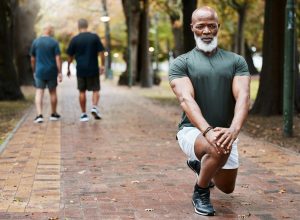After the death of a loved one, you’re going to experience a variety of emotions. Every person is different, but the emotions will range from sadness and confusion, to anger, fear, and disbelief. So much of the grief journey occurs in the mind, but grief also takes a toll on the body. To help yourself grieve and stay on top of the things you “must do,” here are 9 helpful tips to keeping your body healthy while you’re healing emotionally.
1. Establish a routine
Grief will throw your life and routine off balance, so you will need to re-establish a sense of normalcy after a loss. Routines provide a sense of peace and calm amidst the emotional upheaval. You know what’s coming and can enjoy the comfort of regularity. So, determine the best routine for you. This will support your emotional healing as you adjust to what life looks like after the loss of someone loved.
2. Eat a healthy diet
You may be tempted to indulge in sweets and junk food when your emotions are in turmoil but try to maintain a healthy diet. Nourishing food will give you strength to face the difficult days and weeks ahead. When you feel good physically, you will also feel much better emotionally! Unless cooking helps you relax, you might consider meal prepping, so that you have less stress throughout the week.
3. Eat less sugar
As mentioned above, a healthy diet is important to caring for your body. But let’s take a moment to talk about sugar specifically. Sugar in moderation is completely fine, but research shows that too much sugar leads to mood imbalances, fluctuating hormone levels, and increased blood pressure and inflammation. In some people (higher risk in men), it can lead to depression. So, even if you can’t be completely healthy with your diet due to money, time, or energy levels, consider at least cutting back on the sugar.
4. Stay hydrated
Much like food, water is essential to a healthy body. It’s actually even more important. The body can go 3-6 weeks without food but only around 3 days without water. So, as you’re grieving, make sure you stay hydrated. Plenty of water will help regulate your body temperature, assist with digestion, help you absorb nutrients, fight off illness, and improve mood. If you have a tough time remembering to hydrate, set timers or carry a water bottle around with you.
5. Get plenty of sleep
Good sleep is essential for overall health and wellness. After a loss, you may lose sleep due to intrusive thoughts, stress, bad dreams, or anxiety. To promote sleep, try to create a comfortable, cool, and calm atmosphere at night. Over-the-counter sleep aids may also help. If nothing else works, consider talking to your doctor or therapist. For more suggestions, give “Sleeping Tips for the Grieving” a quick read.
6. Exercise regularly
Exercise reduces stress and improves mood, which is important while grieving. If you participated in a regular exercise routine before the death of your loved one, try to continue. If you did not practice a lifestyle of exercise, start small. Take a walk, ride a bike, or pick up small hand weights. Even moderate daily exercise can help improve your mood and relieve stress. To learn more about the benefits of some form of exercise during a time of loss, go to “Can Exercise Help You Grieve?”
7. Avoid numbing activities
Unfortunately, for some, grief can trigger or exacerbate unhealthy coping habits. When these habits are unaddressed or go on too long, they can seriously affect your ability to live a healthy life. If you notice that you are using activities like overeating, drinking, addictive substances, or mindless TV/news watching to avoid confronting painful emotions, it may be necessary to seek assistance. Not only will these habits inhibit your ability to emotionally heal, but they may also affect your long-term physical health.
8. Choose nurturing activities
Instead of numbing activities, engage in activities that feed your spirit and soul. Look for opportunities to do things that bring you joy or give you a sense of fulfillment. Spend time outdoors. Listen to uplifting music (skip the moody stuff for now). Take walks. Get a massage. Volunteer for a cause you believe in. Write in a grief journal. Express your emotions through creativity. Spend time in quiet reflection or meditation. All of these activities will soothe your mind, and in turn, keep your body healthy.
9. Seek out support
If you are struggling with difficult emotions, such as depression, or need a listening ear, don’t hesitate to ask others for help. Trusted friends, family members, therapists, counselors, or grief support groups are all excellent resources to help you on your journey through grief. Grief is something we all go through, but we all experience it differently. You must find the methods that work best for you on your individual journey. Don’t compare your needs to someone else’s – simply find the healthy options that work best for you.
Hopefully these 9 tips will help you on the journey toward healing. It will take time, so be patient with yourself. As you do the work of grief by actively engaging with your emotions, you will begin to see that each day becomes a little brighter. You will never “get over” the death of your loved one; that’s not the point of healing. The goal is to come to terms with it, to make peace with it, and find renewed purpose and meaning in the remainder of your days.













